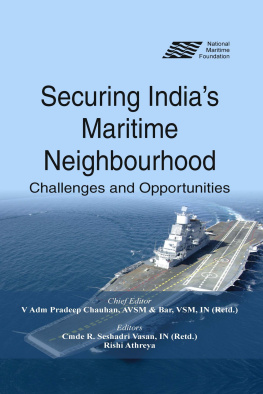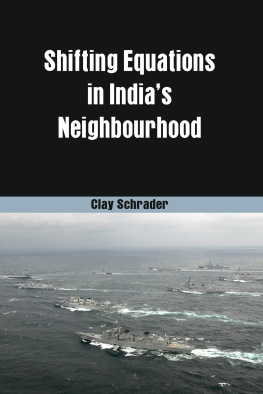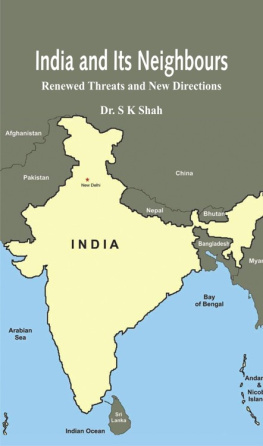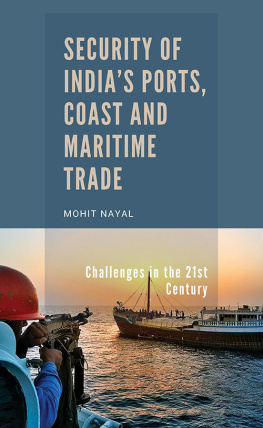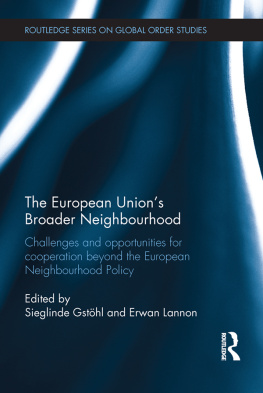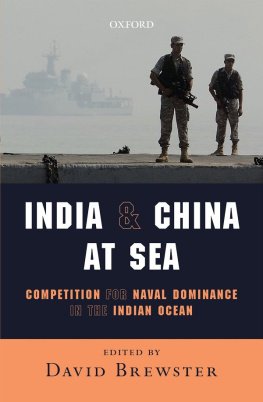Published by
Vij Books India Pvt Ltd
(Publishers, Distributors & Importers)
2/19, Ansari Road
Delhi 110 002
Phones: 91-11-43596460, 91-11-47340674
Mobile: 98110-94883
e-mail:
web: www.vijbooks.com
Copyright 2020, National Maritime Foundation
First Published: 2020
ISBN: 978-93-89620-32-0 (Hardback)
ISBN: 978-93-89620-33-7 (Paperback)
ISBN: 978-93-89620-64-1 (ebook)
All rights reserved.
No part of this book may be reproduced, stored in a retrieval system, transmitted
or utilized in any form or by any means, electronic, mechanical, photocopying,
recording or otherwise, without the prior permission of the copyright owner.
Application for such permission should be addressed to the publisher.
The views expressed in this book are those of the contributors in their personal
capacity. These do not have any institutional endorsement.
With its extensive coastline of 7,516.6 kilometres, India lies at the junction of the busy International Shipping Lanes (ISLs) that criss-cross the Indian Ocean, and this fact shapes much of our maritime-security perspective. In terms of trade-flows, the Indian Ocean Region (IOR) contains three of the worlds busiest and most critical choke-points (viz., the Strait of Hormuz, the Strait of Bab-el-Mandeb, and, the Strait of Malacca), through which about 80 per cent of the worlds seaborne goods pass. It is, therefore, utterly unsurprising that India has a strong and abiding interest in ensuring that the freedom of navigation, underpinned by an internationally-accepted rules-based order at sea, is maintained in this part of the global maritime common. India has an enormous stake in suppressing any and all threats to this internationally-accepted rules-based order at sea, and, consequently, in promoting stability and prosperity in its maritime neighbourhood. Towards these ends, a comprehensive understanding of Indias maritime interests, a thorough knowledge of the United Nations Law of the Sea (UNCLOS) and allied legal instruments such as the Convention on Suppression of Unlawful Activities at Sea (SUA), and, the opportunities, risks and challenges that arise in the application of these instruments of international law to Indias neighbourhood, are obvious necessities. The 39 littoral nations of the Indian Ocean Region (IOR) form Indias Immediate and Proximate maritime neighbourhood constitute an intricate web of interlinked national and regional outlooks and national interests, whose inherent complexity is exacerbated by the moves and countermoves of major extra-regional maritime powers and multinational maritime groupings. These include, inter alia, the USA, the EU, and, most strikingly, China.
Whether or not China poses a direct threat to India, and, over what timeframe, are matters that are moot. However, the fact that Chinas geopolitical moves within the Indian Ocean constitute a risk that India must factor in the maritime manifestations of its own geopolitics is beyond argument. It is highly unlikely that China is actively seeking to surround India. However, the fact nevertheless remains that as China executes her geoeconomic strategies, typified by her ambitious Belt-and-Road (BRI) formulation India is most certainly getting surrounded. Indias consequent geopolitical constriction is no small matter and is something against which it must develop a range of comprehensive and long-term strategies of its own. The centrality afforded by Beijing to the CPoKEC (China-Pak-occupied-Kashmir Economic Corridor) lends great urgency to this process.
In the prime-ministerial articulation of the concept of SAGAR Security and Growth for All in the Region India has the perfect foil to Chinas extractive model of geoeconomic activity. However, Indian strategists are seldom able to recognise that SAGAR is a concept and is not, in and of itself, a strategy. What SAGAR does is to spawn a number of maritime-strategies and it is these that need to be examined critically and holistically. Any serious examination of these strategies must necessarily rest on the foundational understanding that the term security encompasses multiple dimensions that far exceed military security alone and the term maritime is far more than merely a navy-coast guard amalgam. To provide a structural-framework of context and content to this concept of SAGAR, India has been actively seeking to leverage the enormous potential of the Indian Ocean Rim Association (IORA). Any holistic-security structure must have at least three layers: a conceptual layer (here represented by SAGAR), a political layer (here represented by IORA), and, an Executive layer that will actually do the doing (best represented by the Indian Ocean Rima Association [IONS]). The mechanisms by which the executive layer hones its skills so as to optimally execute the political imperatives, which themselves emanate from conceptual clarity about SAGAR, include the activities undertaken by sub-groupings of the IONS, as also the newly established MILAN multinational naval exercise the inaugural edition of which was to be held off Visakhapatnam in March 2020.
While all these Track-1 formulations are underway, a continuous process of long-term analysis at the strategic and operational levels is critical if we are to avoid flash-in-the-pan judgements and the accompanying momentary expressions of either exultation of despair. This is squarely the job that Track-2 structures must perform and perform well. In this regard, it is heartening to note that the National Maritime Foundation (NMF), in close cooperation with the Chennai Centre for China Studies (C3S) and with the willing-support of the Indian Navy and the Indian Coast Guard, had organised an excellently-conducted and well-attended symposium on the theme, Securing Indias Maritime Neighbourhood Challenges and Opportunities, in Chennai, on March 28 2019. Participants included a whole galaxy of luminaries from the serving and veteran echelons of the Indian Armed Forces, the diplomatic community, maritime industry, doyens of Indian academia, and distinguished personalities from the Fourth Estate. A number of facets of seminal importance to national security were addressed in the conference. These included conceptual, geopolitical, economic, environmental and technological issues. At the helm of this initiative was Commodore R Seshadri Vasan, IN (Retd), who heads the C3S and is also the Regional Director (Tamil Nadu) of the NMF. He is deserving of high praise and much commendation for this highly successful endeavour, which is only the latest in a long string of excellent initiatives taken by him over the past several years.
I am delighted to find that the C3S and the NMF have compiled the papers into a compendium for wider dissemination of the excellent ideas and analyses that were on display during the conference. I am certain that the contents of this compendium will prove extremely useful to policy makers, practitioners and scholars alike.
Vice Admiral Pradeep Chauhan
AVSM & Bar, VSM, IN (Retd)
Director-General, NMF
West Asian Littoral: 11 (Bahrain, Iran, Iraq, Israel, Jordan, Kuwait, Oman, Qatar, Saudi Arabia, UAE Yemen); East African Littoral: 14


